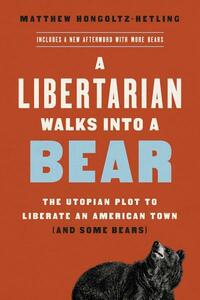You need to sign in or sign up before continuing.
Take a photo of a barcode or cover
challenging
dark
reflective
slow-paced
It wasn't what I expected, but it's still a worthwhile read (if you have the time, motivation, and stomach for it). I was hoping to get more into the policy side of the whole issue, but this book takes a more social historical perspective. I felt like I was given lots of space to make my own judgments and draw my own conclusions. The tone struck me as both poetic and sarcastic/melancholic. Be prepared for descriptions of animal death, animal attacks, illness and injury, guns, poverty, natural disasters, and machismo - just to name a few.
Janusz Korwin-Misie, czyli kuce kontra niedźwiedzie: opowieść o tym, jak grupa amerykańskich libertarian postanowiła przejąć senne amerykańskie miasteczko w New Hampshire i urządzić tam wolnościową utopię, w której dozwolony będzie handel narkotykami i narządami, kazirodztwo, kanibalizm i walki żuli. Z długiej listy życzeń udało im się m.in. ograniczyć podatki, co spowodowało upadek usług publicznych, a do pożarów musiała przyjeżdżać straż pożarna z sąsiednich miasteczek (PROTIP: jeśli myślisz o ochotniczej straży, pamiętaj, że musisz znaleźć ochotników). Próbowali przegłosować ogłoszenie miasteczka strefą wolną od Organizacji Narodów Zjednoczonych, co tak rozzłościło starszych mieszkańców (PROTIP: jeśli chcesz budować utopię, sprawdź, czy na jej terenie już ktoś nie mieszka), że przegłosowali poprawkę, w której ONZ zastąpiono Spongebobem Kanciastoportym. Po drodze do osiągnięcia libertariańskiej nirwany kilkakrotnie pokłócili się między sobą, gość od kazirodztwa i walk żuli finalnie chyba nawet nie przyjechał, reszta zwyzywała się od sługusów systemu i poobrażała na siebie. A na końcu rozpleniły się niedźwiedzie. Bardzo śmieszne, trochę straszne.
It was very funny for me to see a bunch of Don Quixote like characters fight against laws and logic that would protect themselves from bears at a marginal cost.
Book club book. Didn't get as into it as I anticipated.
funny
informative
lighthearted
reflective
slow-paced
Could’ve moved a bit faster, but it’s still shocking that this isn’t fiction. A fun read.
Mind-boggling that this is a real place, with real people (and real bears). How does one begin to describe a book like this? I don’t know. If it wasn’t so early in the year, I might be tempted to review amnesty out of it and just point you in the direction of the many great reviews that have already been written about it.
Matthew Hongoltz-Hetling is a long form journalist who spent a lot of time in the small town of Grafton, New Hampshire, learning about the collision of weirdness that occurred there, when the the anti-tax history of the town, some enterprising bears, and a group of libertarians hell bent on creating a place to live where anyone could be free to do anything, even if that thing was feeding the local wildlife, owning one hundred guns, or cannibalism. The extreme individualist mindset of the (mostly) men of the Free Town Project was fascinating to me, and I was so busy being continually amazed by what was being described in the book, that I mostly forgot to be angry. H-H’s writing is very tongue in cheek, and while he has respect for his subjects, he also doesn’t hesitate to poke a little fun.
For example:
“Instead of building from scratch, they would harness the power and infrastructure of an existing town–just as a rabies parasite can co-opt the brain of a much larger organism and force it to work against its own interests, the libertarians planned to apply just a little bit of pressure in such a way that an entire town could be steered toward liberty.”
And:
“Free State Project organizers tried to relieve this tension by disassociating themselves from the politically problematic Larry Pendarvises of the world. One such prominent Free Stateer was Ian Freeman. On the plus side, Freeman hosted a popular liberty-themed podcast with an international reach that attracted many New Hampshire residents, but on the minus side, he had a long-standing belief that minors could consent to sexual relationships with adults.”
And don’t forget about the bears! As I think the author aptly shows, Grafton’s bears are not like other bears. They are not afraid of people, and the response in the town’s citizens to their encroachment (encouraged by lax to nonexistent human/wildlife management laws and crumbling town infrastructure) ranges from feeding them illegally to illegally slaughtering them as they hibernate for the winter. The less said about the bears here, and specifics, the better. It really is a surprise on every page you must experience for yourself.
Highly recommend this one.
Matthew Hongoltz-Hetling is a long form journalist who spent a lot of time in the small town of Grafton, New Hampshire, learning about the collision of weirdness that occurred there, when the the anti-tax history of the town, some enterprising bears, and a group of libertarians hell bent on creating a place to live where anyone could be free to do anything, even if that thing was feeding the local wildlife, owning one hundred guns, or cannibalism. The extreme individualist mindset of the (mostly) men of the Free Town Project was fascinating to me, and I was so busy being continually amazed by what was being described in the book, that I mostly forgot to be angry. H-H’s writing is very tongue in cheek, and while he has respect for his subjects, he also doesn’t hesitate to poke a little fun.
For example:
“Instead of building from scratch, they would harness the power and infrastructure of an existing town–just as a rabies parasite can co-opt the brain of a much larger organism and force it to work against its own interests, the libertarians planned to apply just a little bit of pressure in such a way that an entire town could be steered toward liberty.”
And:
“Free State Project organizers tried to relieve this tension by disassociating themselves from the politically problematic Larry Pendarvises of the world. One such prominent Free Stateer was Ian Freeman. On the plus side, Freeman hosted a popular liberty-themed podcast with an international reach that attracted many New Hampshire residents, but on the minus side, he had a long-standing belief that minors could consent to sexual relationships with adults.”
And don’t forget about the bears! As I think the author aptly shows, Grafton’s bears are not like other bears. They are not afraid of people, and the response in the town’s citizens to their encroachment (encouraged by lax to nonexistent human/wildlife management laws and crumbling town infrastructure) ranges from feeding them illegally to illegally slaughtering them as they hibernate for the winter. The less said about the bears here, and specifics, the better. It really is a surprise on every page you must experience for yourself.
Highly recommend this one.
challenging
funny
informative
medium-paced
Rating: [C+]
Enjoyed the first 1/3rd or so but I felt like the book unravelled a bit towards the end. I liked hearing about all the interesting characters and their stories but there were also a lot of seemingly unrelated tangents. I found the writing style pretty odd. The sarcastic tone reminded me of reading a buzzfeed news article and there are occasionally these really long drawn out hyperbolic passages that I wasn't a fan of. After reading the ending I'm struggling to work out if there was a real message or through line here.
Enjoyed the first 1/3rd or so but I felt like the book unravelled a bit towards the end. I liked hearing about all the interesting characters and their stories but there were also a lot of seemingly unrelated tangents. I found the writing style pretty odd. The sarcastic tone reminded me of reading a buzzfeed news article and there are occasionally these really long drawn out hyperbolic passages that I wasn't a fan of. After reading the ending I'm struggling to work out if there was a real message or through line here.
Phew! The book was intense. It was incredibly well-written, and I appreciated that the author gave reminders for the large cast of "characters" since there were so many folks that he interviewed, and so many whose story weaved together to tell the tale of the "Free Town" project.
It's not often that I read non-fiction books this voraciously, but something about this one brought out a bear-like appetite and I devoured it over the course of three days. So that says something positive about it, I think!
It's not often that I read non-fiction books this voraciously, but something about this one brought out a bear-like appetite and I devoured it over the course of three days. So that says something positive about it, I think!
emotional
informative
reflective
sad
tense
medium-paced
The book’s second part is one of the most compelling pieces of non-fiction I’ve read, enough to bring me to tears, but the third act was leaving much to be desired.





